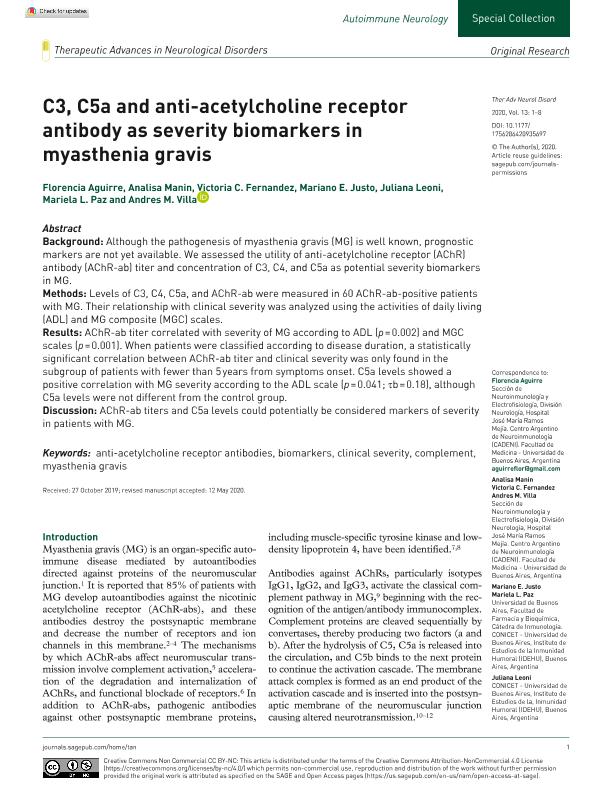Artículo
C3, C5a and anti-acetylcholine receptor antibody as severity biomarkers in myasthenia gravis
Aguirre, Florencia; Manin, Analisa; Fernandez, Victoria C.; Justo, Mariano Ezequiel ; Leoni, Juliana
; Leoni, Juliana ; Paz, Mariela Laura
; Paz, Mariela Laura ; Villa, Andres Maria
; Villa, Andres Maria
 ; Leoni, Juliana
; Leoni, Juliana ; Paz, Mariela Laura
; Paz, Mariela Laura ; Villa, Andres Maria
; Villa, Andres Maria
Fecha de publicación:
08/2020
Editorial:
SAGE Publications
Revista:
Therapeutic Advances in Neurological Disorders
ISSN:
1756-2864
e-ISSN:
1756-2864
Idioma:
Inglés
Tipo de recurso:
Artículo publicado
Clasificación temática:
Resumen
Background: Although the pathogenesis of myasthenia gravis (MG) is well known, prognostic markers are not yet available. We assessed the utility of anti-acetylcholine receptor (AChR) antibody (AChR-ab) titer and concentration of C3, C4, and C5a as potential severity biomarkers in MG. Methods: Levels of C3, C4, C5a, and AChR-ab were measured in 60 AChR-ab-positive patients with MG. Their relationship with clinical severity was analyzed using the activities of daily living (ADL) and MG composite (MGC) scales. Results: AChR-ab titer correlated with severity of MG according to ADL (p = 0.002) and MGC scales (p = 0.001). When patients were classified according to disease duration, a statistically significant correlation between AChR-ab titer and clinical severity was only found in the subgroup of patients with fewer than 5 years from symptoms onset. C5a levels showed a positive correlation with MG severity according to the ADL scale (p = 0.041; τb = 0.18), although C5a levels were not different from the control group. Discussion: AChR-ab titers and C5a levels could potentially be considered markers of severity in patients with MG.
Archivos asociados
Licencia
Identificadores
Colecciones
Articulos(IDEHU)
Articulos de INST.DE EST.DE LA INMUNIDAD HUMORAL PROF.R.A.MARGNI
Articulos de INST.DE EST.DE LA INMUNIDAD HUMORAL PROF.R.A.MARGNI
Citación
Aguirre, Florencia; Manin, Analisa; Fernandez, Victoria C.; Justo, Mariano Ezequiel; Leoni, Juliana; et al.; C3, C5a and anti-acetylcholine receptor antibody as severity biomarkers in myasthenia gravis; SAGE Publications; Therapeutic Advances in Neurological Disorders; 13; 8-2020; 1-8
Compartir
Altmétricas



